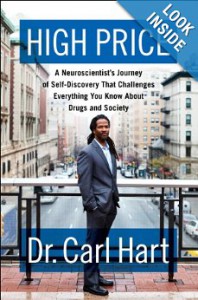![]() As Marijuana Prohibition begins to crumble, the ugly racist truth about the War on Drugs is beginning to come out.
As Marijuana Prohibition begins to crumble, the ugly racist truth about the War on Drugs is beginning to come out.
Everything You Know About Drugs Is Wrong
TESSIE SWOPE CASTILLO – Salon

It’s not every day you read a book that blows the lid off of everything you’ve ever been taught about drugs, but Dr. Carl Hart’s recent work, ‘High Price,” does just that. Part memoir, part myth-buster, the fast-paced read details his journey from a violent Miami ghetto to the halls one of the world’s most prestigious universities.
At the heart of ‘High Price” is the argument that current U.S. drug policies are not only morally wrong, but scientifically wrong as well, a game of politics and fear-mongering in which our government sanctions the widespread prescription of certain drugs, while locking more than 1.5 million people behind bars each year for the use of others. If you’ve ever wondered why our nation pops OxyContin like candy, while its twin sister, heroin, evokes fears of driveling, strung-out junkies, High Price has an answer – just perhaps not the one you were expecting. I caught up with Hart to talk about the book, his career and how he thinks American drug policy needs to change.
What made you decide to write this book – and how did you decide to include personal stories in a book about the science of drugs?



